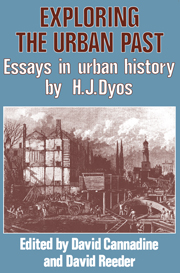Book contents
- Frontmatter
- Contents
- Acknowledgements
- Introduction: H. J. Dyos and the urban process, by David Reeder
- Part One The Urbanising World
- 1 The Victorian city in historical perspective
- 2 Urbanity and suburbanity
- 3 Greater and greater London: metropolis and provinces in the nineteenth and twentieth centuries
- 4 Some historical reflections on the quality of urban life
- Part Two Transport and Urban Transformation
- Part Three The Urban Fabric
- Conclusion Urban history in the United Kingdom: the ‘Dyos phenomenon’ and after, by David Cannadine
- Appendix: A bibliography of the published writings of H. J. Dyos
- Notes
4 - Some historical reflections on the quality of urban life
Published online by Cambridge University Press: 03 February 2010
- Frontmatter
- Contents
- Acknowledgements
- Introduction: H. J. Dyos and the urban process, by David Reeder
- Part One The Urbanising World
- 1 The Victorian city in historical perspective
- 2 Urbanity and suburbanity
- 3 Greater and greater London: metropolis and provinces in the nineteenth and twentieth centuries
- 4 Some historical reflections on the quality of urban life
- Part Two Transport and Urban Transformation
- Part Three The Urban Fabric
- Conclusion Urban history in the United Kingdom: the ‘Dyos phenomenon’ and after, by David Cannadine
- Appendix: A bibliography of the published writings of H. J. Dyos
- Notes
Summary
I write this essay in the English Midlands, in a temporary building circa 1915 which was erected as quarters for nurses alongside the former lunatic asylum then doing duty as a military hospital. Around me stretch the nobler architectural edifices of the latest tenant of this site, the University of Leicester, and beyond it the ancient city of that name, now containing nearly 300,000 people set in a conurbation half as numerous again. The making of this complex of buildings and of this fourteenth city of the kingdom is not difficult to explain, even to the narrow point at which the towering memorial arch in the park, originally dedicated to the dead of World War I, came to exercise its peculiar hold over the height and character of the university buildings which have crept towards it base. But how far can one go in discerning the quality, not simply of these artifacts, but of the life of the community that created and used them?
A diverse economy of small and moderate-sized firms, unruffled industrial relations, a high level of female employment, an escape from serious damage from bombing, have meant for the city and its inhabitants little acquaintance with poverty, no overgrown fortunes, a hundred years of prosperity, and a hard cover of Victorian buildings. Local people still refer unconsciously to a League of Nations report of the 1930s that put Leicester second in riches in Europe after Lille.
- Type
- Chapter
- Information
- Exploring the Urban PastEssays in Urban History by H. J. Dyos, pp. 56 - 78Publisher: Cambridge University PressPrint publication year: 1982



